The Best and Worst Books I Read in 2021
The Best
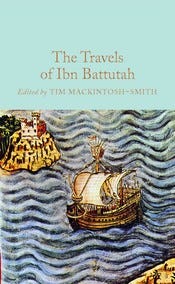
Ibn Battutah, The Travels of Ibn Battutah
Also known as A Masterpiece to Those Who Contemplate the Wonders of Cities and the Marvels of Travelling, this is a wonderful travelogue from the 14th century (or, more appropriately, the 8th century of the Hegira). Battutah was born in Morocco; he was not wealthy, but he was well-educated and went into the family business of Islamic law. At age 21, he set out for the pilgrimage to Mecca. He would extend his journey for decades, however, following traders in ships and caravans, relying on generous Muslim institutions and his talent for befriending rulers. He eventually covered virtually the entire Islamic world and beyond, from North Africa to China.
Battutah gets into all sorts of adventures (luckily escaping death by disease, shipwreck, pirates, bandits, and so on) and provides us with some incredible ethnographic observations. In Constantinople, he meets the Emperor. In India, he becomes a prominent and wealthy administrator under the rule of an erratic Sultan. In the Maldives, he marries six local women and lives a life of leisure under the shade of the palm trees. Yet his wanderlust compels him to keep moving. Battutah himself as a person, however, remains tantalizingly obscure.
Having divorced my wives I set sail. We came to a little island in the archipelago in which there was but one house, occupied by a weaver. He had a wife and family, a few coco-palms and a small boat, with which he used to fish and to cross over to any of the islands he wished to visit. His island contained also banana bushes, but we saw no land birds on it except two crows, which came out to us on our arrival and circled above our vessel. And I swear I envied that man, and wished that the island had been mine, that I might have made it my retreat until the inevitable hour should befall me.
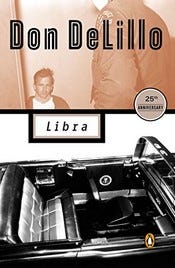
Don DeLillo, Libra
A semi-fictionalized biography of Lee Harvey Oswald in the Oliver Stone tradition, suffused with that great DeLillo style. There's also a kind of meta parallel story of an FBI agent trying to piece together all the evidence, meticulously going through even the tiniest element (much like DeLillo himself). It's quite Pynchonesque with all the criss-crossing conspiracies, the CIA, paranoia, axes of control and influence, a series of coincidences, taking liberty with history...and the ultimately mysterious "fate" that brought Oswald to the assassination. It lacks Pynchon's humor though.
"I don't know what they want me to do." "Of course you know." "Tell me where it happens." "Miami." "That means nothing to me." "You've known for weeks." "What happens in Miami?" Ferrie took a while to finish chewing his food. "Think of two parallel lines," he said. "One is the life of Lee H. Oswald. One is the conspiracy to kill the President. What bridges the space between them? What makes a connection inevitable? There is a third line. It comes out of dreams, visions, intuitions, prayers, out of the deepest levels of the self. It's not generated by cause and effect like the other two lines. It's a line that cuts across causality, cuts across time. It has no history that we can recognize or understand. But it forces a connection. It puts a man on the path of his destiny."
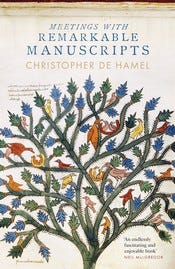
Christopher de Hamel, Meetings with Remarkable Manuscripts: Twelve Journeys into the Medieval World
Twelve chapters, each one dedicated to a different medieval manuscript, from the 6th century Gospels of St. Augustine to the 16th century Spinola Book of Hours. The book is filled with fantastic, gorgeous, high-quality prints from these manuscripts, interspersed with history and commentary in a pleasant conversational style. It's not just about the manuscripts themselves, but also who owned them, their condition, how they've been maintained or altered, where they're housed, and the people taking care of them. Cultural differences in library regulatory practices are a virtually infinite source of comedy. Just lovely all around. Make sure you get the hardcover as the paperback is apparently printed in black & white.
Confirmation that he was indeed both scribe and artist is found in the shape of the spaces left for the insertion of initials. Both scribes 2 and 3 (let us exclude 1 for the moment) left simple rectangular blank spaces where large initials were to be painted later, without thought to their shape or composition, and they added guidewords in the margins to indicate what letters were to be supplied. When Hugo came to fill them in, his flamboyantly fluid and multi-tentacled initials fitted uncomfortably into these big draughty square apertures. However, during the stint written by the last scribe from folio 185v onwards, the edges of the script are moulded line by line to fit around the curves and limbs of the painted initials, nestling together snugly like a newly married couple in bed. Text and decoration must have been executed simultaneously by the same person. In short, scribe 4 must be Hugo.
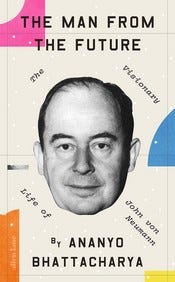
Ananyo Bhattacharya, The Man From the Future: The Visionary Life of John von Neumann
Short, dense, and with a great balance between accessibility and dumbing down complex subjects. Bhattacharya approaches his subject by focusing on ideas. The first chapter takes care of JvN's early life, and the rest of the book is split up based on the subjects he worked on: mathematics, quantum mechanics, the nuclear bomb, computing, game theory, RAND, and artificial life. Large parts of the book (I'd say about a third) are dedicated not to von Neumann but rather the work other people did based on his ideas. The game theory chapter, for example, covers Nash, Schelling, Aumann, etc. in economics, and John Maynard Smith, Price, Hamilton, etc. in evolutionary game theory. Bhattacharya is good at making all these technical subjects accessible without dumbing them down too much. The one failing point is that JvN's personality, personal life, and professional relationships don't get much attention.
From 1944, meetings instigated by Norbert Wiener helped to focus von Neumann’s thinking about brains and computers. In gatherings of the short-lived ‘Teleological Society’, and later in the ‘Conferences on Cybernetics’, von Neumann was at the heart of discussions on how the brain or computing machines generate ‘purposive behaviour’. Busy with so many other things, he would whizz in, lecture for an hour or two on the links between information and entropy or circuits for logical reasoning, then whizz off again – leaving the bewildered attendees to discuss the implications of whatever he had said for the rest of the afternoon. Listening to von Neumann talk about the logic of neuro-anatomy, one scientist declared, was like ‘hanging on to the tail of a kite’. Wiener, for his part, had the discomfiting habit of falling asleep during discussions and snoring loudly, only to wake with some pertinent comment demonstrating he had somehow been listening after all.
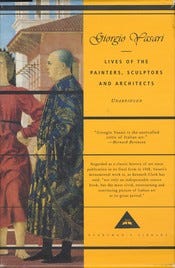
Giorgio Vasari, The Lives of the Most Excellent Painters, Sculptors, and Architects
History by way of biography—Vasari tells a tale of rebirth and artistic progress as Europe emerges from the dark ages, rediscovers the ancients, and then strives to surpass them. Tons of interesting observations on competition, collaboration, the spread of technology, and the psychology of (artistic) greatness. More than 180 lives in over 2000 pages, starting with Cimabue in the 13thC and reaching a climax with Michelangelo in the 16th. Somewhat gossipy and often inaccurate, it nonetheless remains our best source of information on the art and artists of Renaissance Italy. Vasari was a fairly successful painter himself, and his personal aquaintance with both the technique and the business of painting gives us an inside view of the craft. Full review.
It is clear that Leonardo, through his comprehension of art, began many things and never finished one of them, since it seemed to him that the hand was not able to attain to the perfection of art in carrying out the things which he imagined; for the reason that he conceived in idea difficulties so subtle and so marvellous, that they could never be expressed by the hands, be they ever so excellent. And so many were his caprices, that, philosophizing of natural things, he set himself to seek out the properties of herbs, going on even to observe the motions of the heavens, the path of the moon, and the courses of the sun.

Arthur Schopenhauer, Essays and Aphorisms
Excerpts from Parerga und Paralipomena. Unexpectedly hilarious; Arthur would've been one hell of a poaster. Surprisingly similar to the pragmatists in many respects. Spans a huge number of topics: ethics, the will, intelligence, animal welfare, religion, suicide, writing, and much more.
Thus we see, for example, the Catholic clergy totally convinced of the truth of all the doctrines of its Church, and the Protestant clergy likewise convinced of the truth of all the doctrines of its Church, and both defending the doctrines of their confession with equal zeal. Yet this conviction depends entirely on the country in which each was born: to the South German priest the truth of the Catholic dogma is perfectly apparent, but to the North German priest it is that of Protestant dogma which is perfectly apparent. If, then, these convictions, and others like them, rest on objective grounds, these grounds must be climatic; such convictions must be like flowers, the one flourishing only here, the other only there.

Thucydides, The History of the Peloponnesian War
I'm a Herodotus man through and through, but I can appreciate the Thycydidean perspective as well. Though I'm not entirely sure what that perspective entails: how much of his work is prescriptive and how much of it is descriptive? He's obviously a skeptic when it comes to the supernatural, and there's very little room for morality in his history; is this an artifact of the lack of morality in the way the Athenian went about their affairs, or is this something Thuc projects onto them? In any case, while reading this, one must always keep in mind that the Athenians lost!
It's interesting to read an ancient historian write about battles with 60 hoplites and 20 archers, and that kind of accounting accuracy perfectly captures Thuc's personality.
"... For Athens alone of her contemporaries is found when tested to be greater than her reputation, and alone gives no occasion to her assailants to blush at the antagonist by whom they have been worsted, or to her subjects to question her title to rule by merit. Rather, the admiration of the present and succeeding ages will be ours, since we have not left our power without witness, but have shown it by mighty proofs; and far from needing a Homer for our eulogist, or other of his craft whose verses might charm for the moment only for the impression which they gave to melt at the touch of fact, we have forced every sea and land to be the highway of our daring, and everywhere, whether for evil or for good, have left imperishable monuments behind us. Such is the Athens for which these men, in the assertion of their resolve not to lose her, nobly fought and died; and well may every one of their survivors be ready to suffer in her cause."
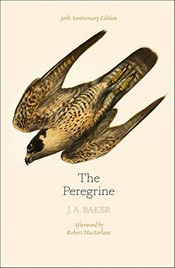
J. A. Baker, The Peregrine
10 years of obsessive, monomaniacal peregrine-watching in the East of England distilled to 200 pure, intense, astonishing pages. An incredibly rich dish that you can only eat so much of before needing to take a break. Reflects and contains nature both in its form and content. Somewhat reminiscent of Urne-Buriall in that it starts out in a dry, scientific tone and then reaches stylistic extremes later on.
Famously recommended by Werner Herzog (along with Virgil and The Short Happy Life of Francis Macomber), and it is indeed extremely Herzogian. There's no green idealism here, the endless cycle of killing which sustains the peregrine is presented unapologetically. "Beauty is vapour from the pit of death", Baker writes.
He hovered, and stayed still, striding on the crumbling columns of air, curved wings jerking and flexing. Five minutes he stayed there, fixed like a barb in the blue flesh of the sky. His body was still and rigid, his head turned from side to side, his tail fanned open and shut, his wings whipped and shuddered like canvas in the lash of the wind. He side-slipped to his left, paused, then glided round and down into what could only be the beginning of a tremendous stoop. There is no mistaking the menace of that first easy drifting fall. Smoothly, at an angle of fifty degrees, he descended; not slowly, but controlling his speed; gracefully, beautifully balanced. There was no abrupt change. The angle of his fall became gradually steeper till there was no angle left, but only a perfect arc. He curved over and slowly revolved, as though for delight, glorying in anticipation of the dive to come. His feet opened and gleamed golden, clutching up towards the sun. He rolled over, and they dulled, and turned towards the ground beneath, and closed again. For a thousand feet he fell, and curved, and slowly turned, and tilted upright. Then his speed increased, and he dropped vertically down. He had another thousand feet to fall, but now he fell sheer, shimmering down through dazzling sunlight, heart-shaped, like a heart in flames. He became smaller and darker, diving down from the sun. The partridge in the snow beneath looked up at the black heart dilating down upon him, and heard a hiss of wings rising to a roar. In ten seconds the hawk was down, and the whole splendid fabric, the arched reredos and immense fan-vaulting of his flight, was consumed and lost in the fiery maelstrom of the sky.
And for the partridge there was the sun suddenly shut out, the foul flailing blackness spreading wings above, the roar ceasing, the blazing knives driving in, the terrible white face descending, hooked and masked and horned and staring-eyed. And then the back-breaking agony beginning, and snow scattering from scuffling feet, and show filling the bill’s wide silent scream, till the merciful needle of the hawk’s beak notched in the straining neck and jerked the shuddering life away.
And for the hawk, resting now on the soft flaccid bulk of his prey, there was the rip and tear of choking feathers, and hot blood dripping from the hook of his beak, and rage dying slowly to a small hard core within.
And for the watcher, sheltered for centuries from such hunger and such rage, such agony and such fear, there is the memory of that sabring fall from the sky, and the vicarious joy of the guiltless hunter who kills only through his familiar, and wills him to be fed.
The Worst

William Hazlitt, Selected Writings
I despise the style of his political writings. Puffed up, aiming to dazzle rather than illuminate. The cheap rhetoric of the ochlagogue. Actively offensive. The non-political writings are much better: they are merely unreadable and sophomoric. Hazlitt's entire aesthetic philosophy just boils down to "art should imitate nature" repeated over and over again, and I can't stand the way he expresses it.
It is not denied that the people are best acquainted with their own wants, and most attached to their own interests. But then a question is started, as if the persons asking it were at a great loss for the answer,—Where are we to find the intellect of the people? Why, all the intellect that ever was is theirs. The public opinion expresses not only the collective sense of the whole people, but of all ages and nations, of all those minds that have devoted themselves to the love of truth and the good of mankind,—who have bequeathed their instructions, their hopes, and their example to posterity,—who have thought, spoke, written, acted, and suffered in the name and on the behalf of our common nature. All the greatest poets, sages, heroes, are ours originally, and by right.

Carlos Ruiz Zafón, The Shadow of the Wind
Just a dull airport novel. The coincidences pile on top of eachother as we are treated to interminable exposition dumps from improbable sources that conveniently know everything. Stylistically it tries too hard and achieves nothing.
Destiny is usually just around the corner. Like a thief, a hooker, or a lottery vendor: its three most common personifications. But what destiny does not do is home visits. You have to go for it.
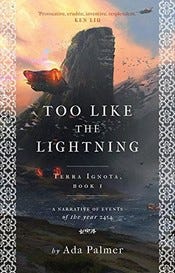
Ada Palmer, Too Like the Lightning
Love Palmer's blog but this book just wasn't for me. Even though I read plenty of older books, I found the affected faux-18thC style absolutely grating. The plot mostly seems to be based on the Star Wars prequels, with endless scenes of characters talking about the taxation of trade routes or some other similarly boring nonsense. And there's a magical boy thrown in there for good measure, as well.
I could ask any contemporary here, ‘Are you a majority?’ and I know what he or she would answer: Of course not, Mycroft. I have a Hive, a race, a second language, a vocation and an avocation, hobbies of my own; add up my many strats and you will soon reduce me to a minority of one, and hence my happiness. I am unique, and proud of my uniqueness, and prouder still that, by being no majority, I ensure eternal peace. You lie, reader. There is one majority still entrenched in our commingled world, a great ‘us’ against a smaller ‘them.’ You will see it in time. I shall give only one hint—the deadliest majority is not something most of my contemporaries are, reader, it is something they are not.




